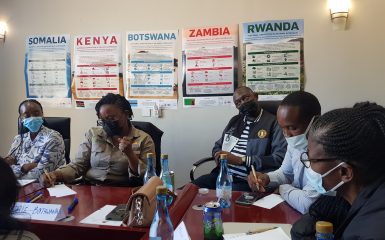Analysis and commentary on the Network’s experiences coordinating climate-resilient development.

What Is Next for South–South Peer Learning on Adaptation? Reflecting on peer learning in post-pandemic times
By Catherine Fisher, Blane Harvey, and Ying-Syuan (Elaine) Huang
This blog provides a better understanding of how to translate in-person learning and exchange into equitable and impactful virtual formats for the climate change community.

NAP Global Network at COP27
Sharm el-Sheikh, Egypt | Nov 6 – 18, 2022
The National Adaptation Plan (NAP) Global Network Secretariat’s expertise will be reflected at these COP27 side events.

Les parties prenantes régionales fournissent des retours essentiels au plan d’adaptation aux changements climatiques de Madagascar
Les acteurs régionaux se sont réunis pour discuter comment assurer la réussite de la mise en œuvre du plan national d’adaptation de Madagascar.

Regional Stakeholders Provide Critical Feedback for Madagascar’s Climate Change Adaptation Plan
Regional actors got together to discuss how to ensure the successful implementation of Madagascar’s National Adaptation Plan.

Ghana Begins a Series of District-Level Vulnerability Assessments to Inform its NAP Document
Assessments aim to better understand the impacts of the changing climate at the local level
Six district-level climate vulnerability assessments will be conducted, guided by the country’s NAP Framework.

Por qué la implicación del público es esencial para las acciones de adaptación climática: el fortalecimiento de las medidas de adaptación al nivel comunitario en el Perú
Entrevista a Jessica Tsamajain Lirio, jefa de la Reserva Comunal Tuntanaín
La jefa de la Reserva Comunal Tuntanaín, Jessica Tsamajain Lirio, añade el contexto del por qué es tan importante la participación del público en el proceso del Plan Nacional de Adaptación.

Why Public Engagement Is Essential for Climate Adaptation Action: Strengthening locally led adaptation in Peru
An interview with the Tuntanain Communal Reserve Chief, Jessica Tsamajain Lirio
Tuntanain Communal Reserve Chief Jessica Tsamajain Lirio provides further context as to why public engagement with the National Adaptation Plan process is so important.

Tonga Engages Media, Steps Up Communications Efforts on the National Adaptation Plan
The Government of Tonga was granted with professional video equipment to support the country’s efforts in communicating its climate change impacts and adaptation planning to the public.
The Government of Tonga was granted with professional video equipment to support the country’s efforts in communicating its climate change impacts and adaptation planning to the public.

Conference of Panchayats (CoP): Catalyzing Local Action to Achieve Global Climate Goals
Kirtiman Awasthi and Somya Bhatt, GIZ India, and Ashish Tiwari, Government of Uttar Pradesh
The Conference of Panchayats 2022 fostered the discussions on strengthening capacities of local institutions and actors on emerging climate risks and uncertainties and developing evidence-based local solutions.

Countries Learn from One Another about the Monitoring, Evaluation, and Learning of Adaptation
Representatives from seven African countries explored key challenges in establishing MEL systems and emerging solutions.
Representatives from Botswana, Kenya, Liberia, Namibia, Nigeria, Rwanda, and Somalia explored key challenges in establishing Monitoring, Evaluation and Learning (MEL) systems and emerging solutions in a NAP Global Network’s peer learning event.

Private Sector and NGO Engagement in Rwanda’s NAP Process: Experiences and adaptation examples
Lessons from a workshop on monitoring, evaluation, and learning (MEL) of adaptation in the agriculture sector
Rwanda is advancing its NAP process with the engagement of the country’s private sector and NGOs, particularly in the agriculture sector.

What We Heard From the Global Stocktake’s First Technical Dialogue on Adaptation
By Jeffrey Qi, Policy Analyst II, International Institute for Sustainable Development
June’s Bonn Climate Change Conference started an important part of the inaugural 2-year Global Stocktake under the Paris Agreement. What did participants say about climate change adaptation during the Global Stocktake’s first Technical Dialogue, and what does it mean for global adaptation ambition?